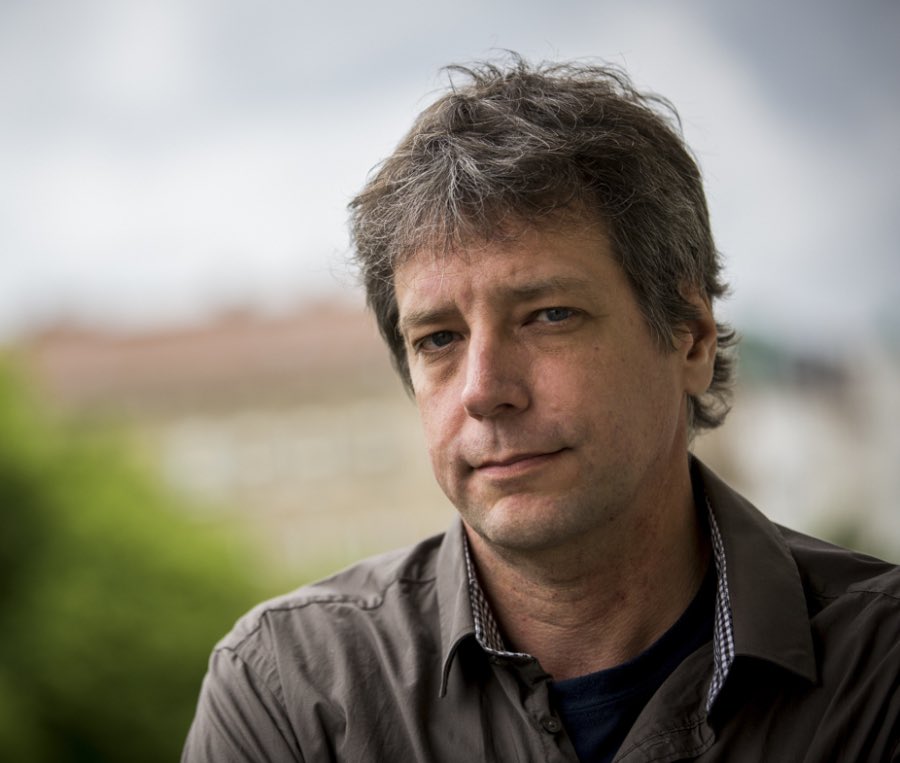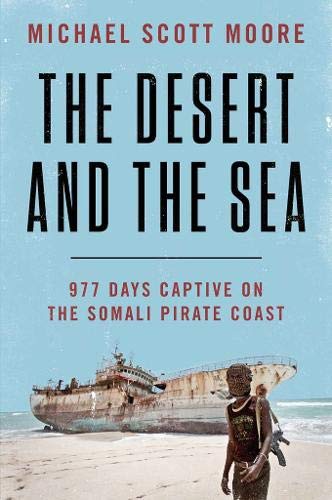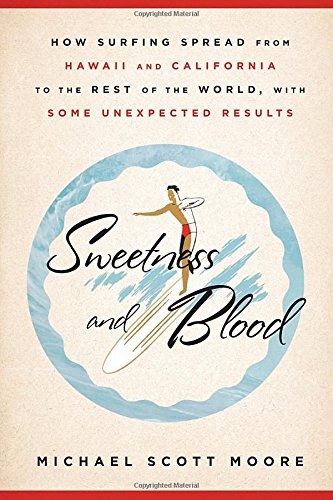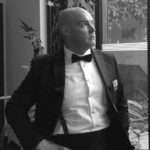TCR Talks with Michael Scott Moore
by Matt Ellis
As a writer, Michael Scott Moore has covered the gambit of disciplines. As a freelance journalist, Moore has worked for the American and German press, covering a range of topics from theater, travel, politics, science, and Post-traumatic Stress Disorder (PTSD) or outlets like Spiegel Online (now Der Spiegel), The Atlantic, The New Republic, the Los Angeles Times, and many more. Though his novel Too Much of Nothing was his first long-form prose, he is best known for his creative nonfiction work, which has involved traveling the globe to rough and violent areas. For his surfing history, travel, and lifestyle book Sweetness and Blood, Moore journeyed from the birthplace of the sport in the islands of Hawaii to Germany, England, Japan, Cuba, Indonesia, Israel, and Cuba. In 2012, during a Pulitzer Center for Crisis Reporting grant research trip to Somalia, Moore was kidnapped by Somali pirates. He wrote about his captivity and the people who held him hostage in his award-winning memoir, The Desert and the Sea: 977 Days Captive on the Somali Pirate Coast. Moore graduated from the University of California at San Diego with a degree in German literature. He speaks, reads, and writes fluent German and holds dual U.S.-German citizenship. In addition to being awarded the Pulitzer Center grant, Moore has been honored with Logan and Fulbright fellowships for nonfiction and MacDowell and Yaddo fellowships for fiction. Since the release of The Desert and the Sea, Moore has been a featured speaker about his capture, PTSD, and violent threats to journalists.

In August 2020, I connected with Michael Scott Moore via FaceTime to discuss his approach to writing in so many different forms, experiences working as an editor and journalist for both the American and German press, covering stories in austere and violent places, cancel culture, and threats to journalists’ well-being and credibility.
The Coachella Review: Coming from California, you’ve been all over the place. How did you go from Redondo Beach surfer to author and journalist?
Michael Scott Moore: Surfing was never my career. It only occurred to me to write a book about surfing after I moved to Berlin, shortly after the release of my first book [Too Much of Nothing], and realized how many people outside of California liked to surf. I noticed that Germany had a surf scene, and I thought, well, that’s interesting. How did that get there? That was the beginning of Sweetness and Blood. It occurred to me that all these places, all these countries that had a surf scene, also had a story behind how it got there. So, I simply took some journalistic skills and applied myself to that question. I went to Israel, which was in the news around the same time for a cooperation between Israeli and Palestinian surfers. I wrote about the surfers in Germany. I’d already been to Indonesia. Then I went to Morocco. It occurred to me that I could build a book by going to a few more countries. By then, I was already writing for Spiegel, so the notion of writing about another country and inquiring about the culture and how something like surfing might have clashed with it didn’t seem too unusual.
TCR: I was amazed by the rapport and confidence you were able to build with people, like Amat and Haji in Sweetness and Blood, people who usually would be at complete odds with talking to an American. How did you learn that?
MSM: That was a question of just being friendly and calm. I got to know Amat first, and he was just a very easygoing guy. Once we established a relationship and I spent a couple of days with him, I asked to talk to a few more people in his village. He called in a few people, including Haji, who happened to be not just a devout Muslim, but possibly a radical one. It was hard to tell, but that was just the feeling I got from him. It’s not that I felt in danger, it’s just that it was a particularly sensitive time to be traveling in Muslim countries.
TCR: Definitely. And in The Desert and the Sea, when you write about challenging one of your captors in Somalia about female circumcision not being in the Qur’an—I was taken aback.
MSM: By that time, I had been a hostage for a couple of months, and I found I could be friends with the lower-ranking guards. I think on that particular day, they had actually let me out of my room to sit in the sun on the deck of the room where they were holding me. They started by being nice to me, so it was already a little bit more relaxed. I felt like I could ask them a sensitive question.
 TCR: You started writing theater reviews in the United States and then moved [to Germany] to work for Spiegel. How did you approach your work in Germany?
TCR: You started writing theater reviews in the United States and then moved [to Germany] to work for Spiegel. How did you approach your work in Germany?
MSM: I was writing a theater column while I wrote my first novel, Too Much of Nothing. My marriage fell apart and, in effect, so did my whole life. I decided to do something very decisive. I wasn’t going to stick around in San Francisco while my ex-wife and my best friend got married. I knew it was cheaper to live in Berlin than in LA or New York. I established a new life in Germany, which turned out to be a great idea. Within a few months, I was working for Spiegel in Berlin. I was using aspects of myself that I hadn’t used in California at all, including the language and using my German passport. And that’s the paradox. I went from moving to Berlin, to feeling nostalgic about California or wanting to surf, to really becoming curious about this aspect of surfing and then writing Sweetness and Blood.
TCR: It seems that German and American audiences would have distinct tastes and expectations. Was there an adjustment period, or did you have to change your style and approach?
MSM: First of all, I couldn’t be as personal as I was in San Francisco, where I was writing a theater column in very much my own voice. A little bit caustic. A little bit funny. And in Berlin, at least, I started with just straight news. I did quite a lot of editing for the [Spiegel Online] website before I did any writing, but I think the first feature I wrote was based on some reporting I’d done in California [on] intelligent design [school curriculum controversy over courses in alternatives to evolutionary theory M.E.]. The story came to a head with a trial in America right around that time, so I banged that story into shape. With that, I could use my own voice a little more, rather than just writing straight news, and it had an effect. The intelligent design people, who were not very honest, had to answer that article. That was very satisfying. Germans don’t necessarily need all of the things that American readers need in a feature. When we wrote and edited features for Spiegel, we didn’t always worry too much about a lead. But, when we were writing for English language readers, we would try to restate the piece so that it did have a lead. First of all, it was an international audience, so you couldn’t assume that people knew things. Writing for a local audience in San Francisco, you assumed a certain number of shared values.
TCR: Were there any hard lessons learned in the early days writing in Germany?
MSM: No, it went well. I mean, when I first landed in Germany, I was just teaching English, so that was kind of a drag. I think what happened was that I wrote a feature about neo-Nazis for Salon very early on and the editor of Spiegel noticed that and took me on. The thing about that is, to Americans, a piece about the resurgence of neo-Nazis in Germany might seem like a very natural piece. But my German friends were like, ‘Oh Jesus, that’s such a cliché.’
 TCR: There’s a growing cancel culture in America of people not only voting with their wallets but boycotting as well. Having traveled extensively and worked in the international press, do you think that’s an American phenomenon? Does that exist in other places?
TCR: There’s a growing cancel culture in America of people not only voting with their wallets but boycotting as well. Having traveled extensively and worked in the international press, do you think that’s an American phenomenon? Does that exist in other places?
MSM: It definitely exists in other places. But I always thought that one of the good things about America was that it existed less. And by the way, it has traditionally existed more on the Right, no matter what people say. Why it has become so popular on the Left? I don’t understand. But there was recently a story about a singer in Nigeria who said the wrong thing about Mohammed in a rap song and he’s going to be put to death. We don’t have anything like that, but the relative atmosphere of freedom is one thing that’s terrific about the United States, and I don’t see why anyone, especially those who call themselves liberals, would want to see that go away. Republicans love to bash people on the Left for cancel culture, but it’s always been worse on the Right. The ideological width, let’s say, within Republican circles has always been a lot stronger. I don’t see why the Left needs anything like that at all. We’ve really had a wonderful number of decades where thought could really grow freely in the United States, and there’s no reason it shouldn’t continue.
TCR: That’s an important distinction when looking at those issues from a global stage perspective, where a person can literally get killed for their expression, like in the Charlie Hebdo case. (The office of French satire magazine Charlie Hebdo was attacked twice, a 2011 firebombing and 2015 deadly shooting, by Muslim extremists over their cartoon depictions of the Prophet Muhammad). But there’s also been a lot of conversation about writing ‘the other’ in areas like YA fiction and when American Dirt came out last year.
MSM: It’s really interesting to read interviews from other generations. There was an interesting interview with Faulkner where he says a writer shouldn’t have any fences at all. It should recognize no restrictions on imagination. That said, I did just teach a seminar at Columbia, and obviously this came up. It’s not bad to have a high bar for writing characters who are not like you. If you’re going to do it, you have to do it well. Frankly, the true rules of writing a living character should be a lot more demanding, a lot scarier to the average writer than an uproar on Twitter.
TCR: That’s true. The process should be uncomfortable, right?
MSM: It should. Rules should be hard. But nobody should be canceled just because they were the wrong race and wrote about a certain ethnicity. That’s an aspect that seems worrying, but I think most of the controversies have also been about the quality of the writing.
TCR: You’ve written fiction, nonfiction, and worked as a journalist. How do you move between these different styles?
MSM: To me, it’s a spectrum. A continuum. I want to continue doing them all. But it is a different way of using your head, so I try to dedicate one day to fiction or nonfiction. I’m working on a couple of projects right now.
TCR: How do you choose what you are going to follow next?
 MSM: It’s the project that builds momentum. It announces itself. For example, the novel I’m working on was already going by the time the last book [The Desert and the Sea] came out, so there was no question.
MSM: It’s the project that builds momentum. It announces itself. For example, the novel I’m working on was already going by the time the last book [The Desert and the Sea] came out, so there was no question.
TCR: With the Desert and the Sea, you ended up being the subject of your own writing. Has that experience changed your approach with other projects?
MSM: Not necessarily. That was not the point with that book. But I had certainly written nonfiction from my own point of view before. In essence, it was like the travel writing in Sweetness and Blood, but it had to be more personal memoir and that was the difficult part of that book. I’d never written a personal memoir before. Although I knew exactly what had happened in Somalia, dealing with that material wasn’t as difficult as trying to figure out how much of my own life to bring into it. How much was enough? How much was too much? I had to balance this personal memoir with writing a worthwhile journalistic book, too.
TCR: You have worked to bring a lot of attention to violent threats to journalists worldwide. Have you seen any changes since you started?
MSM: If anything, it’s gotten worse in America. Luckily, the tenor has eased off a little bit. When I first started to talk about Somalia, a little bit before the book came out, which was even before Trump got elected, we started seeing pictures of people at rallies with t-shirts that said, ‘Rope. Tree. Journalist [Some Assembly Required].’ That was a really new atmosphere in America, and thankfully it hasn’t developed into anything as scary as it sounded. But that, as well as the recent police attacks on journalists trying to cover [Black Lives Matter] protests in the streets, these are new developments. I don’t know if young people can quite understand that. I’ve just written an essay about this, which should be out by the time this interview is published, but the Trump rallies really did remind me of the neo-Nazi rallies that I attended for that first article in Germany. The energy was the same. The attitude against journalists was the same. That’s when I realized we were dealing with something really remarkable in the United States.
Matt Ellis is polishing his reading glasses and sharpening his pencils—look for his review of Michael Scott Moore’s new book, coming to The Coachella Review in 2021. In the meantime, follow Michael Scott Moore on Twitter for updates and to watch for links to his short stories and essays, including his essay on the changing atmosphere of journalism discussed in the interview.
 Matt Ellis is a retired Army officer serving as a security expert in Guatemala. Over the years, he’s been a HUMINT officer, counterintelligence agent, linguist, diplomat, musician, and Christmas tree trimmer (the machete kind). He’s a freelance reviewer for Publishers Weekly and was the staff screenwriter for Pacific Rim Media. His short fiction has been published at Thought Catalogue. He holds an MS in Information Security from the University of Maryland Global Campus and is studying Fiction at UCR Palm Desert’s Low-Residency MFA program in Creative Writing and Writing for the Performing Arts. Find him at www.letswriting.com.
Matt Ellis is a retired Army officer serving as a security expert in Guatemala. Over the years, he’s been a HUMINT officer, counterintelligence agent, linguist, diplomat, musician, and Christmas tree trimmer (the machete kind). He’s a freelance reviewer for Publishers Weekly and was the staff screenwriter for Pacific Rim Media. His short fiction has been published at Thought Catalogue. He holds an MS in Information Security from the University of Maryland Global Campus and is studying Fiction at UCR Palm Desert’s Low-Residency MFA program in Creative Writing and Writing for the Performing Arts. Find him at www.letswriting.com.
